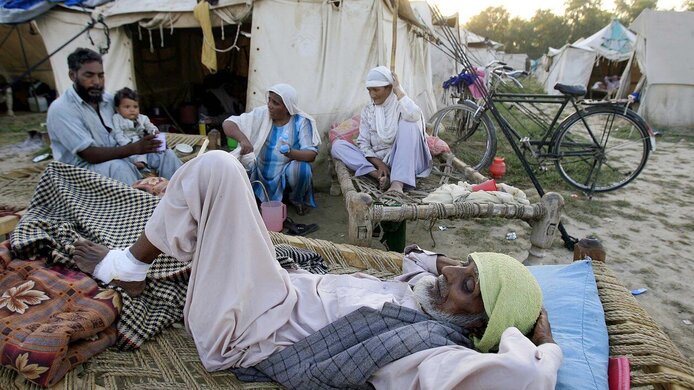Faith-based humanitarian aid

The famous question: “Where do you stand on religion?” plays not only a crucial role in Goethe’s play Faust, but also in matters of humanitarian aid. In terms of impact, the amount of donations raised and reputation of work worldwide, it can make a difference as to whether a humanitarian aid organisation is faith-based or has a secular background. The sociologist Zeynep Sezgin from the Department of Development Studies at the University of Vienna wanted to know which strategies faith-based humanitarian NGOs pursue in order to gain and maintain legitimacy. As part of a Lise Meitner Fellowship funded by the Austrian Science Fund FWF, she took a closer look at two Muslim and one Christian faith-based aid organisations. “All three case studies concern organisations which are headquartered in countries of the Global North, viz. in Germany and Austria, but provide humanitarian aid in various crisis zones in the Global South, viz. in Pakistan. In these diverse contexts, faith-based humanitarian NGOs are confronted with and shaped by the complex and sometimes contradictory religious and secular expectations of various stakeholders. I’ve studied their responses to these expectations”, explains the sociologist. And this is what she found: in order to ensure professional humanitarian work, raise donations, gain access to people in need, protect their aid workers in crisis zones and hold their own in the competitive environment of aid work, the three organisations, Caritas, Islamic Community Millî Görüş and Muslims Help, often pursue similar stratagems.
Humanitarian principles as gold standard
In a series of anonymous interviews, Zeynep Sezgin talked to various staff members from the three organisations, with authorities in Austria, Germany and Pakistan, as well as to secular aid organisations (Red Cross and Médecins Sans Frontières). During two research visits in Pakistan, after the country had been hit by severe floods in 2010 and 2011, the academic also interviewed local humanitarian organisations, leadership figures and the local population in Khyber Pakhtunkhwa. “My interviews revealed that secular organisations consider themselves to be the standard-bearers of humanitarian aid. They are sceptical of faith-based humanitarian NGOs, because they often work in a different way and not necessarily in compliance with the traditional humanitarian principles of impartiality, neutrality and independence. Since 9/11 and the ‘war on terror’, this scepticism has also become more widespread not only among donors and authorities in the Global North but also among the authorities and local populations in the Global South”, she notes. Having said this, the sociologist warns against generalisation and perceives many common aspects in the organizations’ humanitarian work: “The organisations under review have to cope with different and potentially conflicting sacred and secular expectations in order to gain and maintain legitimacy. To safeguard the interests of their organisations, their humanitarian efforts combine both religious and secular elements.” All activities are carried out in compliance with national and international laws (regulatory compliance strategy). All three NGOs have made it their mission to obtain access to people in distress through the knowledge, skills and expertise of their staff (cognitive strategy). The academic also refers to a result-based strategy, which involves the organisation’s ability to demonstrate to stakeholders that its mission has been fulfilled, e.g. by means of successful, transparent communication structures.
Standardisation of the aid market
Every aid organisation, whether it be new or traditional, faith-based or secular, is vying for attention, resources and credibility. Accordingly, the sociologist identifies an expectation-driven standardisation. “The organisational strategies of many humanitarian NGOs are showing an increasing level of similarity. What we are observing aren’t any truly new or parallel humanitarian systems, but shifting networks of various stakeholders.” Secular and faith-based humanitarian NGOs are often united in their desire to help people in need but they often hinder each other with their rivalry for resources, explains Sezgin. The discussion about what exactly protection and help should involve is ongoing, especially whenever scandals erupt around humanitarian aid missions. “Most of the people I interviewed in Pakistan don’t care about the religious background of the organisation: they want help to be needs-based and not dependent on good political contacts”, the sociologist points out. “They prefer long-term engagement and respect of local traditions and cultures.” Sezgin is convinced that, in this context, faith-based NGOs could provide new perspectives.
Personal details Zeynep Sezgin is a postdoc and lecturer at the Department of Development Studies, University of Vienna. She studied international relations at the University of Bilkent (Turkey), political science at the University of Guelph (Canada) and acquired her PhD in sociology at the University of Leipzig (Germany). Her main research interests are migration processes, transnationalisation and organisational sociology, as well as humanitarian NGOs and development policies.
Publications
Sezgin, Z. und Dijkzeul, D. (eds.): The New Humanitarians in International Practice: Emerging Actors and Contested Principles, Routledge 2016
Sezgin, Z. und Dijkzeul, D.: Migrant Organizations in Humanitarian Action, Journal of International Migration and Integration 2013
Sezgin, Z. und Dijkzeul, D.: Bridging Diverse Expectations in Germany and Pakistan: The Transnational Legitimization Strategies of Caritas, in: M. Maletzky, M. Wannöffel and M. Seeliger (eds.) Arbeit, Organisation und Mobilität: Eine grenzüberschreitende Perspektive, Campus 2013





